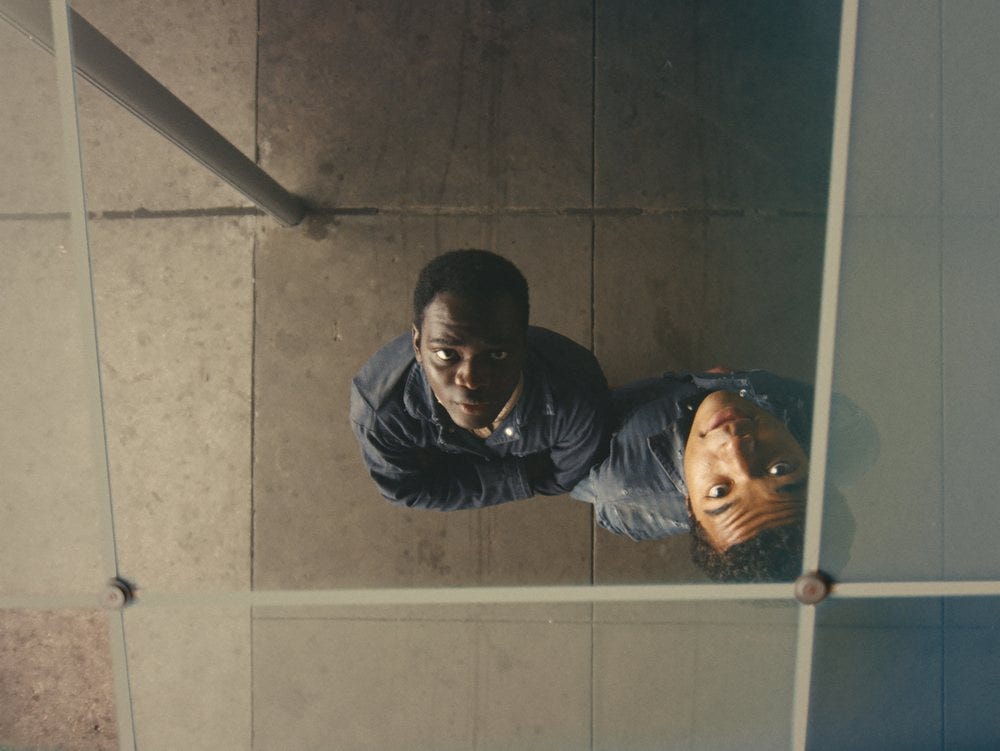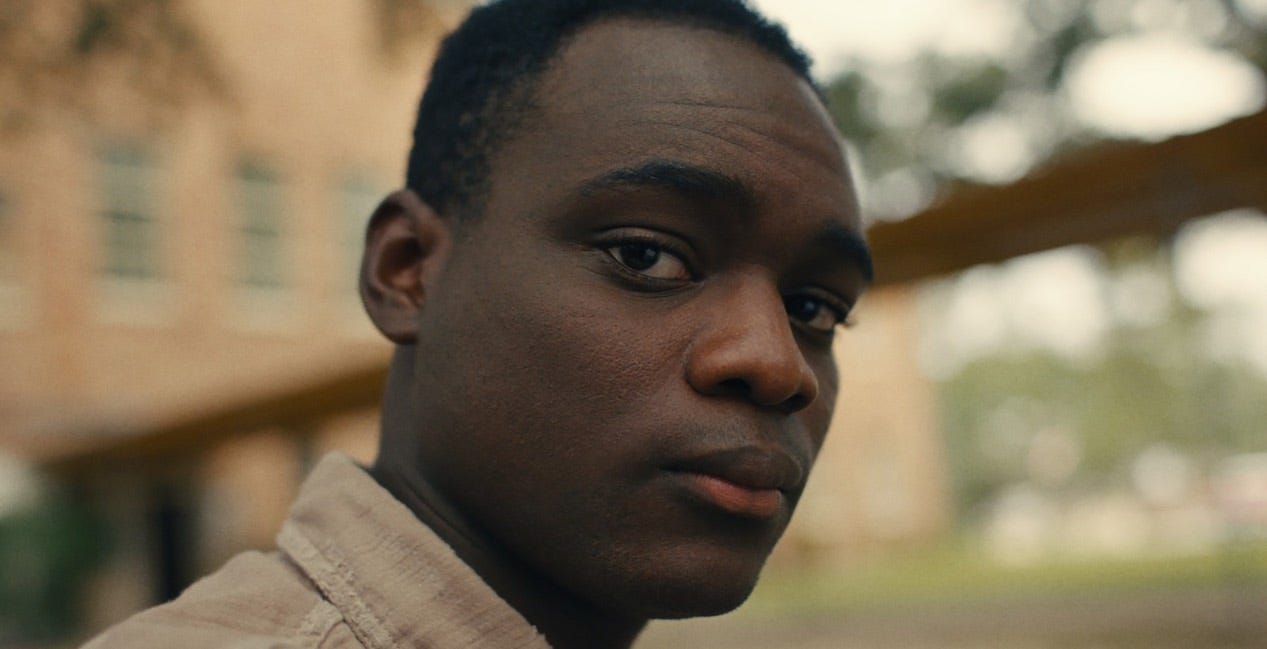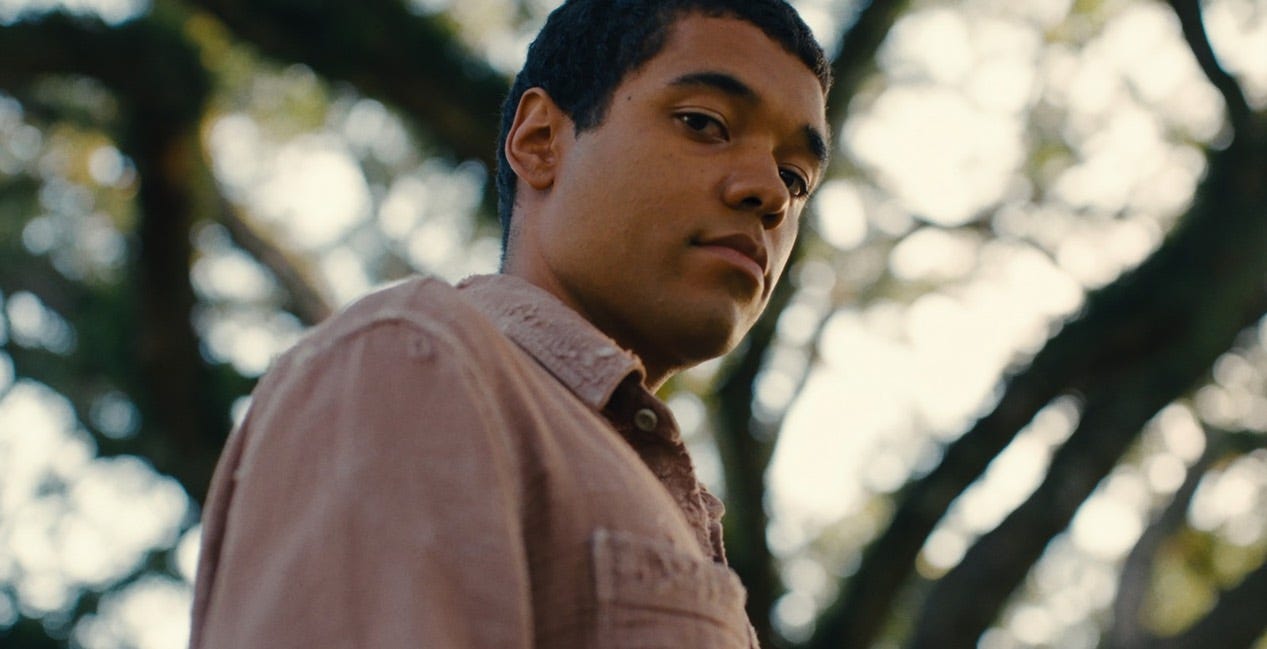Nickel Boys (2024)
In 1960s Florida, two young Black men struggle against a relentless, racist system
Nickel Boys (2024)
In theaters
Emotion recollected in tranquility is how the poet William Wordsworth summed up the pathway to truth.
Nickel Boys is concerned with emotion recollected across tranquility, yes, but also social justice, bonds of friendship and implacable racist cruelty.
It’s “recollection” that the movie conjures so brilliantly. We all need to study that word. Recollecting is “re-collecting”, pulling together instances of the past, laying them side by side, and seeing what they reveal in new, ever-shifting combinations.
Put another way, recollecting is work, and director RaMell Ross and his co-writer Joslyn Barnes fragment what we see, so we have to put it together as we watch, assemble meaning. We can’t assume that simply recounting the past tells us the truth, or that there’s only one truth, or one way to look at it.
Freely adapted from Colson Whitehead’s Pulitzer Prize winning 2019 novel The Nickel Boys, the movie, set in the early 1960s as the civil rights movement is flourishing nationally, splinters memory. Two young men are puzzling out an era the country around them still hasn’t properly named.
Elwood (Ethan Herisse) is a gifted Black teenager eager to enter the world. He’s been thoughtfully raised by his loving grandmother Hattie (Aunjanue Ellis-Taylor) in the part of Tallahassee known as Frenchtown.
One of his teachers, a former Freedom Rider, tells the young man he’s got the makings of a social activist and encourages him to apply to a college offering aid to talented Blacks.
En route to enroll, Elwood hitches a ride. Life, that devil, tosses him to the wolves. The car is stolen and though Elwood is innocent of any crime, he’s sent to a notorious Florida reformatory for boys called Nickel.
Ellwood
The inmates are Black and white, but the institution is rigidly segregated. Blacks in separate, inferior housing get fewer privileges, eat less appetizing food, and are corralled and beaten with a marked fervor. (Hamish Linklater chillingly plays Spencer, a cold-eyed sadist who removes his wedding ring before laying his whip across boys’ backs.)
Lessons against being uppity are inculcated, not “rehabilitation”. The boys are more like slave labor, picking oranges, cleaning and painting nearby homes of wealthy whites, chopping wood, hauling trash.
Elwood befriends Turner (Brandon Wilson), wise in the ways of white supremacy, who’s doing his second stint at Nickel. Street-hardened in Houston, without family, Turner is the crafty survivor in a rigged system. He calmly tries to disillusion Elwood of his belief in social justice, that wrongs can be righted.
Ellwood won’t be dissuaded. After all, he counters, his grandmother has hired a lawyer who promises to free him. And he’s keeping a diary of the transgressions at Nickel. That diary will one day prove to the world what an outrage the place is.
Ross and his astoundingly talented cinematographer Jomo Fray, who shot the breathtaking All Dirt Roads Taste of Salt (2023), are not just artistic but soul collaborators. I can’t recall being more thrilled by two artists merging their talents. This is a match made by the movie gods.
They shoot not in linear fashion but in a way that splits time and events into dazzling fragments. We see fleeting glimpses of the Christmas tree Ellwood looked up at as a child, the moment he caught a reflection of himself in a store window, where multiple televisions showed a speech delivered by Martin Luther King.
Or we see his face reflected in the shiny steam iron his grandmother glides across her ironing board. And from the wider world, shots of a moon landing. From history, photos of marches, lynchings, three Black girls in pretty dresses strolling on a summer day.
Most inventively, we see events from the first-person point of view of one boy looking at the other.
Which means we see the character’s face when one is looking at the other. Shots of the two boys together only come later. We hear Elwood speak for roughly a half hour before the camera pivots to show us his face. Turner, too, is heard by Elwood and others before we see his face.
Rather than distance us, these techniques force us to intuit what’s being felt from what’s being heard and only partly shown. That is, we have to work to understand how the cruelties being inflicted on these young men are penetrating their hearts.
The abominations are both historical and chilling. Whitehead’s novel is drawn from his research about a real place in Florida, the Arthur G. Dozier School for Boys, which remained open from 1900 to 2011, shut down after shocking, horrifying discoveries came to light.
Boys there were not only beaten and starved, many – well over a hundred; no one knows the exact count – murdered and buried in mass graves. Only in recent years has this ghastly travesty of “justice” been fully exposed.
Turner
Yet the movie does something wholly unexpected. It captures immense sadness without fully succumbing to it.
In its closing segments, an older Elwood (Daveed Diggs) plunders the past trying to elicit the truth of what happened, to ease a sorrow that can’t be erased. We see this older Elwood shot mostly from behind. We have his point of view but can’t yet claim it as our own.
Herisse and Wilson as the two trapped young men do movingly understated work. Their shiny eagerness floats above the horror around them. The actors imbue these ill-fated young men with the charm of hope.
And they’re complex. Turner is no innocent, and Elwood is no simpleton. The system is bigger and more bottomlessly cruel than young minds can comprehend.
Ellis-Taylor’s Hattie, however, understands the snares life can lay. The actress has at least two stunning moments that make her performance indelible.
One comes when she arrives at Nickel hoping to visit Ellwood and is told she can’t see him. “I came all this way”, she frets to a young man she happens on. In fact, it’s Turner. Since she didn’t get to hug Ellwood, she hugs him. He’s off camera. We hear him but are left with the image of Hattie’s radiant face.
The second comes when she talks to Ellwood without, it seems, him actually being seated opposite her. We grasp that she’s most profoundly talking to herself.
Her plan to free her grandson from Nickel has collapsed because the lawyer she hired has absconded with the money she paid him.
“I let you down”, she says to Ellwood, and the heartbreak that pours from the actress’s face shattered me. The blameless blaming themselves. Cruelty coiled up, getting a rotten place, in the souls of its victims.
So much of the national work of recounting and exposing such injustice, the gathering of fragments of memory, remains to be done.
Emotion recollected in sorrow and fury. In its gorgeously becalmed way, this picture is telling us all to get busy.






